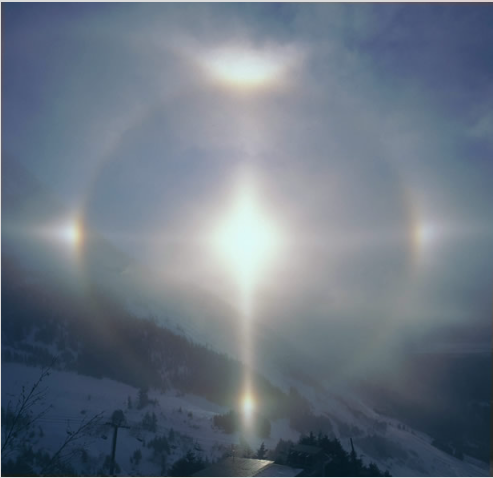Halo cross - Alaska
Halo Cross - A Spectacular Atmospheric Phenomenon in Alaska
The halo cross is a mesmerizing optical phenomenon that has captivated the attention of artists and illustrators alike. This celestial spectacle occurs when the sun is low on the horizon, and it is a combination of several atmospheric phenomena. One can witness a horizontal parhelic circle sweeping through the sun, accompanied by vertical upper and lower sun pillars. This unique combination creates the illusion of a cross suspended in the sky, hence the name "halo cross."
One of the most stunning sightings of the halo cross took place during a diamond dust display in Alaska, as captured by the talented photographer Ryan Skorecki. His images beautifully showcase this rare phenomenon, giving us a glimpse into the wonders of the Alaskan skies. The intricate patterns and vibrant colors of the halo cross add an ethereal touch to the already breathtaking landscape.
The halo cross is a result of light interacting with ice crystals suspended in the atmosphere. These ice crystals act as prisms, bending and refracting light to create the various components of the halo cross. The horizontal parhelic circle is formed when light passes through these ice crystals horizontally, resulting in a circular band around the sun. The vertical sun pillars, on the other hand, are created when light interacts with plate-shaped ice crystals oriented vertically in the atmosphere.
The exact conditions required for the formation of a halo cross are quite specific. First and foremost, the sun must be low on the horizon, typically during sunrise or sunset. Additionally, there must be an abundance of ice crystals present in the atmosphere. These ice crystals can take various forms, including plates, columns, or needles, each contributing to the unique characteristics of the halo cross.
Although the halo cross is an awe-inspiring sight to behold, it is relatively rare compared to other atmospheric optical phenomena. Its occurrence depends on a delicate balance of weather conditions and ice crystal formation, making it a captivating yet elusive phenomenon. However, when all the necessary elements align, lucky observers are treated to a celestial masterpiece that leaves a lasting impression.
The halo cross is not only a visual delight but also a scientific marvel. By studying the intricate details of its formation, scientists gain valuable insights into the properties of ice crystals and their interaction with light. This knowledge helps us better understand the physics behind atmospheric optics and contributes to advancements in meteorology and atmospheric science.
In conclusion, the halo cross is a captivating atmospheric phenomenon that enchants both artists and scientists alike. Its formation requires specific conditions and the presence of ice crystals in the atmosphere. When witnessed, it adds a touch of magic to the Alaskan skies, creating a stunning spectacle that is sure to leave a lasting impression. Whether appreciated for its aesthetic beauty or studied for its scientific significance, the halo cross continues to intrigue and inspire all who have the privilege of witnessing its splendor.

A "Halo Cross" beloved of artists and illustrators.
The cross is formed when the sun is low and is a combination of a horizontal parhelic circle sweeping through the sun and vertical upper and lower sun pillars.
Imaged during an Alaskan diamond dust display by Ryan Skorecki (more images and site)
Image ©Ryan Skorecki, shown with permission.
Note: this article has been automatically converted from the old site and may not appear as intended. You can find the original article here.
Reference Atmospheric Optics
If you use any of the definitions, information, or data presented on Atmospheric Optics, please copy the link or reference below to properly credit us as the reference source. Thank you!
-
<a href="https://atoptics.co.uk/blog/halo-cross-alaska/">Halo cross - Alaska</a>
-
"Halo cross - Alaska". Atmospheric Optics. Accessed on December 23, 2024. https://atoptics.co.uk/blog/halo-cross-alaska/.
-
"Halo cross - Alaska". Atmospheric Optics, https://atoptics.co.uk/blog/halo-cross-alaska/. Accessed 23 December, 2024
-
Halo cross - Alaska. Atmospheric Optics. Retrieved from https://atoptics.co.uk/blog/halo-cross-alaska/.